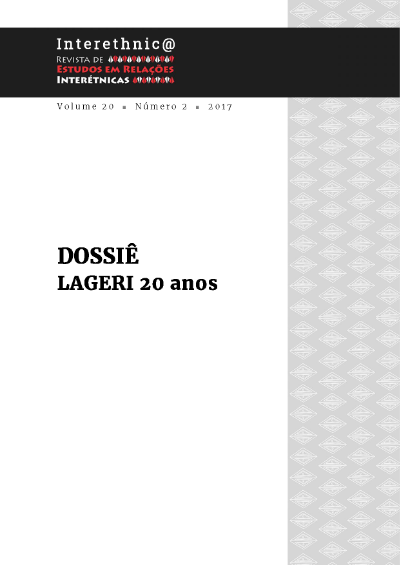Etnogênese e Movimento Indígena: Lutas Políticas e Identitárias na Virada do Século XX para o XXI
DOI:
https://doi.org/10.26512/interethnica.v20i2.10616Keywords:
ethnogenesis, indigenous movement, identity.Abstract
In this article I attempt to retake the debate around the notion of ethnogenesis, extending it to the historical context of Latin America and the Caribbean and relating it to the category of Indigenous Peoples, used by ethnic-political movements (but differing itself from movements of nationalistic character) around the world. What Lévi-Strauss called the warm-up of indigenous societies at the end of the twentieth century, which other authors describe as an awakening of the indigenous movement, continues to provoke debates within and outside academia. As a result of direct contact with the colonizers, but indicating a reverse movement of land and rights, as well as of symbols, self-esteem and native pride, such contemporary movements are imbricated in the different claims of ethnic identity that came to form the so-called ethnogenesis, redoubling in turn the concern of States with such new forms of political organization, such as the Brazilian case that is addressed here.
Downloads
References
ARRUTI, José Maurício Andion. A emergência dos “remanescentes”: notas para o diálogo entre indígenas e quilombolas. Mana 3(2):7-38, 1997.
BANIWA, Gersem dos Santos Luciano. O índio brasileiro: o que você precisa saber sobre os povos indígenas no Brasil de hoje. Brasília: UNESCO, 2006.
BARTH, Fredrick. Ethnic groups and boundaries: the social organization of culture difference. Bergen ”“ Oslo: Universitets Forlaget; London: George Allen & Unwin, 1969 ”“ Reprint 1970.
BARTOLOMÉ, Miguel Alberto. As etnogêneses: velhos atores e novos papeis no cenário cultural e político. Mana 12(1): 39-68, 2006.
CARDOSO DE OLIVEIRA, Roberto. [1964] O índio e o mundo dos brancos ”“ 4ª Ed. Campinas, SP: UNICAMP, 1996.
_______. O movimento dos conceitos na antropologia. Revista de Antropologia, v. 36, p. 13-31, São Paulo, USP, 1993.
_______. Identidade étnica, identificação e manipulação. In CARDOSO DE OLIVEIRA, Roberto. Identidade, etnia e estrutura social. São Paulo: Pioneira, 1976.
COELHO, Ruy. Os Karaíb Negros de Honduras. Revista do Museu Paulista, Volume XV, p. 7-212, São Paulo, 1964.
CUNHA, Manuela Carneiro da. Cultura com aspas e outros ensaios. São Paulo: Cosac Naify, 2009.
IAMOND, Stanley. In Search of the Primitive: A Critique of Civilization. New Brunswick: Transaction Books, 1974.
LÉVI-STRAUSS, Claude. Un autre regard. In: L'Homme, 1993, tome 33 n°126- 128. La remontée de l'Amazone. pp. 7-11.
LÓPEZ-GARCÉS, Cláudia Leonor. A questão indígena na Colômbia: movimentos indígenas, políticas indigenistas e conflito armado. In REPÚBLICA FEDERATIVA DO BRASIL / GABINETE DE SEGURANÇA INSTITUCIONAL / SECRETARIA DE ACOMPANHAMENTO DE ESTUDOS INSTITUCIONAIS. I Reunião de Estudos: Ascenção de Movimentos Indigenistas na América do Sul e Possíveis Reflexos para o Brasil. Brasília, Gabinete de Segurança Institucional; Secretaria de acompanhamento de estudos institucionais, 2004.
MAYBURY-LEWIS, David. Vivendo Leviatã: grupos étnicos e o Estado, 103- 118, Anuário Antropológico/83. RJ: Tempo Brasileiro; Fortaleza: UFC, 1985.
NIEZEN, Ronald. The origins of indigenism: human rights and the politics of identity. Berkeley and Los Angeles: University of California Press, Ltd., 2003.
PACHECO DE OLIVEIRA, João. Uma etnologia dos “índios misturados”? Situação colonial, territorialização e fluxos culturais, Mana 4(1): 47-77 (1998).
PEREIRA, Ricardo Neves Romcy. Comunidade Canafé: história indígena e etnogênese no médio rio Negro. Dissertação de mestrado em Antropologia Social. PPGAS/UnB. Brasília, 2007, 165 páginas.
RAMOS, Alcida Rita. Revisitando a etnologia à brasileira. In MARTINS, Carlos Benedito; DUARTE, Luiz Fernando Dias. Horizontes das ciências sociais no Brasil: antropologia. São Paulo: ANPOCS, 2010.
_______. Convivência interétnica no Brasil: os índios e a nação brasileira. (Trabalho apresentado no Simpósio Internacional “Autonomías étnicas y estados nacionales” organizado por Alicia Barabas e Miguel Bartolomé,
Oaxaca, México, 25-27 de junho de 1997). Série Antropologia, 221. Brasília, DAN/UnB, 1997.
REPETTO, Maxim. Ascenção dos movimentos indígenas na América do Sul e possíveis reflexos para o Brasil: o caso da Venezuela. In REPÚBLICA FEDERATIVA DO BRASIL / GABINETE DE SEGURANÇA INSTITUCIONAL /
SECRETARIA DE ACOMPANHAMENTO DE ESTUDOS INSTITUCIONAIS. I Reunião de Estudos: Ascenção de Movimentos Indigenistas na América do Sul e Possíveis Reflexos para o Brasil. Brasília, Gabinete de Segurança
Institucional; Secretaria de acompanhamento de estudos institucionais, 2004.
SIDER, Gerald M. Lumbee Indian cultural nationalism and ethnogenesis (Case study). Dialectical Anthropology, p. 161-172, 1975.
TREJO, Guillermo. Etnia e mobilização social: uma revisão teórica com aplicações à “quarta onda” de mobilizações indígenas na América Latina. In DOMINGUES, José Maurício; MANEIRO, María (Orgs.). América Latina hoje: conceitos e interpretações; tradução Silvia de Souza Costa. Rio de Janeiro: Civilização Brasileira, 2006.
VIVEIROS DE CASTRO, Eduardo. “No Brasil todo mundo é índio, exceto quem não é”. In RICARDO, Beto; RICARDO, Fany (edição geral). Povos indígenas no Brasil: 2001/2005. São Paulo: Instituto Socioambiental (ISA), 2006.
Downloads
Published
How to Cite
Issue
Section
License
COPYRIGHT AND EXCLUSIVITY
At the time of submission, authors undertake not to send this manuscript to another journal during the reviewing process. Conversely, the Journal does not accept articles that are still under review in other journals. Neither will it accept two simultaneous reviews of the same author, understanding that this constitutes simultaneity.
Submission automatically implies full assignment of the copyright, including translation, if the article is approved for publication. Authors may reproduce their articles, provided that the original source (Interethnic Journal) is cited
GOOD SCIENTIFIC PRACTICES
TAll submitted articles will be submitted to plagiarism and "self-plagiarism" or republishing (publication as unpublished material of texts already published). Eventual cases of bad practice will be examined and decided by the editorial committee according to the guidelines of the National Council for Scientific and Technological Development (CNPQ).
The integrity of the content of the articles is the sole responsibility of the authors.



